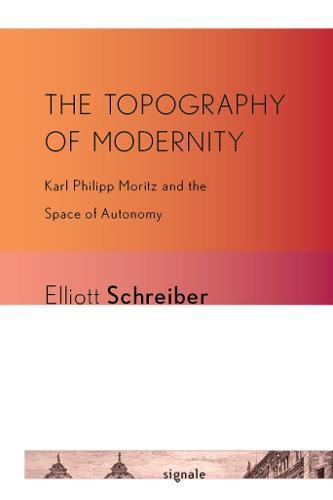Full Product Details
Author: Elliott Schreiber
Publisher: Cornell University Press
Imprint: Cornell University Press
Dimensions:
Width: 15.20cm
, Height: 1.40cm
, Length: 22.90cm
Weight: 0.454kg
ISBN: 9780801478086
ISBN 10: 0801478081
Pages: 277
Publication Date: 15 March 2013
Audience:
College/higher education
,
Postgraduate, Research & Scholarly
Format: Paperback
Publisher's Status: Active
Availability: To order

Stock availability from the supplier is unknown. We will order it for you and ship this item to you once it is received by us.
Language: English
Reviews
Karl Philipp Mortiz's peculiar life story, his writing's apparent lack of systematicity, as well as the difficulty to categorize his work all contributed to the relative neglect (especially in the U.S.) of this important eighteenth-century thinker who made major contributions to the eighteenth-century knowledge base. Elliot Schreiber['s] erudite study offers the long-needed response to this neglect. It establishes Moritz as a central voice of Enlightenment who offers a distinctive (and skeptical) perspective on major tenets of his era and across various fields: aesthetics, pedagogy, pyschology, and political theory. -- Edgar Landgraf * Lessing Yearbook * Schreiber makes a compelling case that spatial metaphors inform Moritz's understanding of a series of institutions that are each caught up in processes of transformation in the late eighteenth century, and he makes an eloquent case for the modernity of Moritz's thought in these areas. This will prove to be an indispensable book, not just to students of Moritz, but more generally to students of the German eighteenth century, the Age of Goethe, and the European Enlightenment. -- Nicolas Rennie * The German Quarterly *
Karl Philipp Mortiz's peculiar life story, his writing's apparent lack of systematicity, as well as the difficulty to categorize his work all contributed to the relative neglect (especially in the U.S.) of this important eighteenth-century thinker who made major contributions to the eighteenth-century knowledge base. Elliot Schreiber['s] erudite study offers the long-needed response to this neglect. It establishes Moritz as a central voice of Enlightenment who offers a distinctive (and skeptical) perspective on major tenets of his era and across various fields: aesthetics, pedagogy, pyschology, and political theory. --Edgar Landgraf Lessing Yearbook Schreiber makes a compelling case that spatial metaphors inform Moritz's understanding of a series of institutions that are each caught up in processes of transformation in the late eighteenth century, and he makes an eloquent case for the modernity of Moritz's thought in these areas. This will prove to be an indispensable book, not just to students of Moritz, but more generally to students of the German eighteenth century, the Age of Goethe, and the European Enlightenment. --Nicolas Rennie The German Quarterly
Schreiber makes a compelling case that spatial metaphors inform Moritz's understanding of a series of institutions that are each caught up in processes of transformation in the late eighteenth century, and he makes an eloquent case for the modernity of Moritz's thought in these areas. This will prove to be an indispensable book, not just to students of Moritz, but more generally to students of the German eighteenth century, the Age of Goethe, and the European Enlightenment. * The German Quarterly * Karl Philipp Mortiz's peculiar life story, his writing's apparent lack of systematicity, as well as the difficulty to categorize his work all contributed to the relative neglect (especially in the U.S.) of this important eighteenth-century thinker who made major contributions to the eighteenth-century knowledge base. Elliot Schreiber['s] erudite study offers the long-needed response to this neglect. It establishes Moritz as a central voice of Enlightenment who offers a distinctive (and skeptical) perspective on major tenets of his era and across various fields: aesthetics, pedagogy, pyschology, and political theory. * Lessing Yearbook *
Author Information
Elliott Schreiber is Associate Professor of German Studies at Vassar College.




